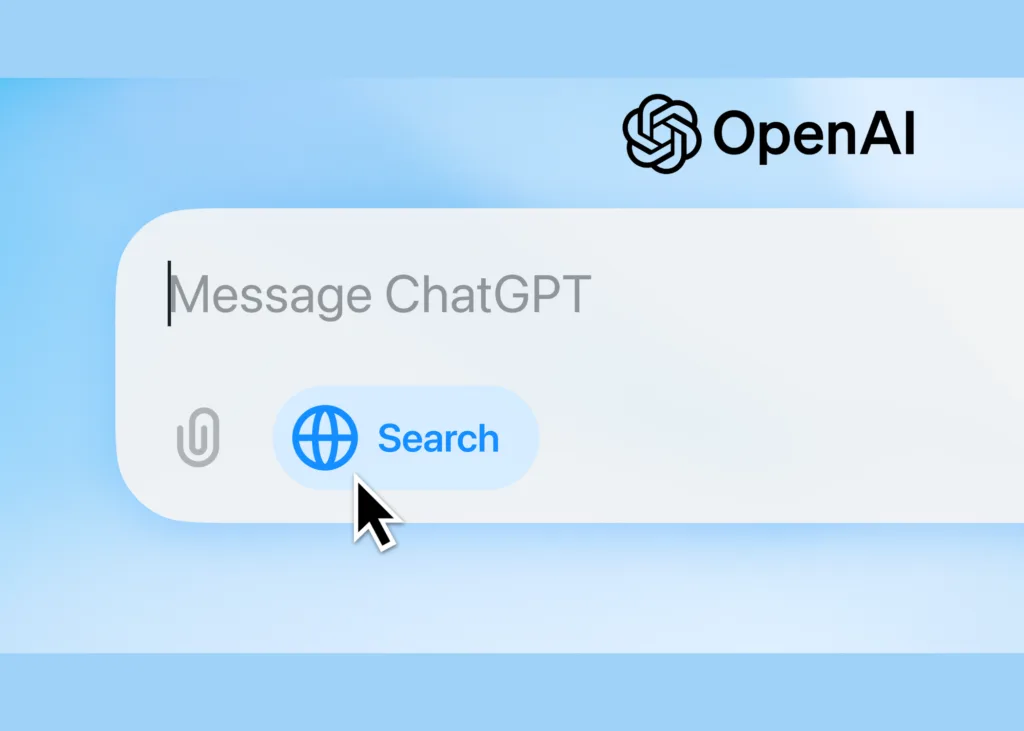In a significant move that bridges the gap between artificial intelligence and traditional web search, OpenAI has unveiled its enhanced ChatGPT Search feature. This groundbreaking development represents a fundamental shift in how users interact with and access information online, combining the intuitive nature of conversational AI with the vast knowledge base of the internet.
The Revolution in Information Access
At its core, ChatGPT Search transforms the conventional search experience by allowing users to pose questions in natural language and receive contextually relevant responses backed by real-time web sources. Unlike traditional search engines that return a list of links, ChatGPT Search provides coherent, synthesized answers while maintaining transparency through source attribution.
The system’s ability to parse complex queries and deliver nuanced responses marks a significant advancement in search technology. Users can now engage in more natural, conversation-like interactions while accessing up-to-date information from across the web.
Must read: OpenAI Unveils SearchGPT Prototype: A Leap Forward in AI-Driven Search Technology
Strategic Partnerships and Publisher Integration
OpenAI’s collaboration with prominent media organizations, including Vox Media and the Financial Times, underscores its commitment to quality journalism and reliable information. These partnerships serve a dual purpose: ensuring content accuracy and supporting the sustainability of digital journalism. Publishers benefit from increased visibility and traffic, while users gain access to authoritative sources within their conversational interface.
Technical Innovation and User Experience
The integration of web search capabilities with ChatGPT’s language model represents a remarkable technical achievement. The system must balance several complex tasks simultaneously:
- Processing natural language queries
- Conducting real-time web searches
- Synthesizing information from multiple sources
- Generating coherent, contextual responses
- Maintaining source attribution and accuracy
User accessibility has been carefully considered in the rollout strategy. While initially available to ChatGPT Plus and Team subscribers, OpenAI plans to expand access to free users gradually, ensuring system stability and optimal performance as the user base grows.
Future Developments and Implications
Looking ahead, OpenAI has outlined ambitious plans for expanding ChatGPT Search’s capabilities, particularly in specialized areas such as shopping and travel. The continuous improvement approach, driven by user feedback from the SearchGPT prototype phase, suggests ongoing refinements to enhance accuracy and user experience.
The broader implications for the information access landscape are profound. This technology could revolutionize how people interact with online information, potentially shifting user behavior away from traditional search engines toward more conversational, AI-driven interfaces.
Industry Impact and Challenges
The introduction of ChatGPT Search raises important questions about the future of digital content consumption and distribution. Publishers must adapt to this new paradigm while maintaining their audience relationships and revenue streams. The technology also presents challenges regarding information accuracy, source verification, and the potential for AI-generated misinformation.
Beyond the Traditional Search Engine: What Makes ChatGPT Search Unique?
Traditional search engines are great for quick answers or pulling up a list of links related to your query. But they don’t always engage in follow-up questions, personalized suggestions, or context-building to the extent that a conversation does. ChatGPT’s search feature takes things a step further by merging the powers of an advanced AI chat model with reliable, real-time search capabilities. Now, instead of simply providing a list of links or snippets, ChatGPT uses the information it retrieves to offer context-rich responses, explain concepts, and suggest related ideas or further questions you might find interesting.
This conversational layer of search makes all the difference: you’re no longer left to sift through pages of results or refine your search queries repeatedly. With ChatGPT’s search, you can guide the AI to dig deeper, ask for clarifications, or zero in on certain aspects of a topic. It’s designed to feel like a personalized assistant, as though you’re engaging in an intelligent dialogue with someone who has instant access to all the latest information.
Key Benefits and Use Cases of ChatGPT Search
The new search feature in ChatGPT is packed with potential for everyday users, professionals, students, and just about anyone curious to learn more about the world. Here’s a closer look at some of its standout benefits and practical applications:
- Staying Updated on Trending Topics
Whether you want to know the latest on a major event, get real-time data on stocks, or track sports scores, ChatGPT’s search function can deliver the latest updates as they happen. Instead of hopping between news sites or refreshing feeds, you can ask ChatGPT for concise, up-to-the-minute reports, making it easier to stay informed on what matters to you. - Retrieving Factual, Sourced Information
A traditional search engine might provide results from a variety of sources without verifying their credibility or relevance. ChatGPT’s search, however, draws from trusted sources, prioritizing accuracy and reliability. And when it provides information, it includes citations and direct links to the sources it pulls from, giving users the chance to explore the content further if they want to. - Deeper Exploration and Insight Gathering
With ChatGPT, exploring complex topics becomes smoother and more insightful. You can ask follow-up questions, dive into subtopics, and guide the conversation to reach a deeper understanding. This is especially useful for people researching niche topics or needing nuanced explanations—think students working on projects, professionals seeking industry insights, or even hobbyists looking to learn about specialized subjects. - Improved Productivity and Learning
With quick, reliable information at your fingertips, you can work more efficiently and gain deeper knowledge faster. Whether you need research assistance, quick data points, or a summary of a complex concept, ChatGPT’s search can help you stay focused and productive. It’s almost like having a personal assistant who doesn’t just retrieve information but also processes and interprets it with you. - Educational Support and Knowledge Expansion
Imagine studying for an exam and needing explanations on specific concepts. ChatGPT’s search can pull in definitions, examples, and contextual insights, helping students grasp tough subjects without endlessly scrolling through unrelated results. This can also be useful for people wanting to expand their general knowledge, as ChatGPT can suggest related areas of interest or point out connections you might not have considered.
Who Has Access, and What’s Next?
Currently, the ChatGPT search feature is available to OpenAI Plus and Team subscribers, as well as those on the SearchGPT waitlist. This limited rollout allows OpenAI to refine and optimize the experience before expanding it to a larger audience. But the intention is to open it up more broadly, so that soon, more users will have this enhanced search capability at their fingertips.
Conclusion
ChatGPT Search represents more than just a technical advancement; it’s a fundamental reimagining of how humans interact with information online. By combining the power of AI with traditional web search capabilities, OpenAI has created a tool that could significantly influence how we discover, consume, and understand information in the digital age.
As this technology continues to evolve, its impact on users, publishers, and the broader digital ecosystem will likely grow, potentially reshaping the landscape of information access for years to come. The success of this initiative will ultimately depend on its ability to maintain accuracy, transparency, and user trust while delivering on the promise of more intuitive and efficient information access.



